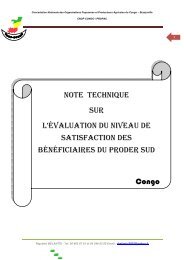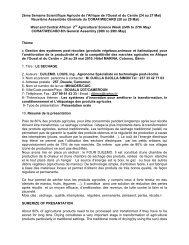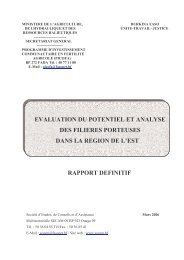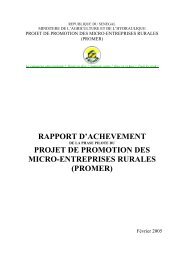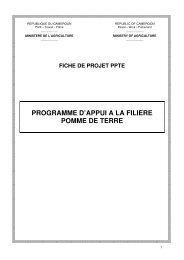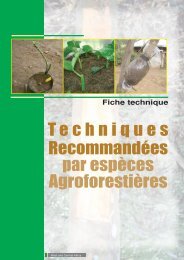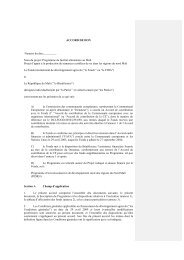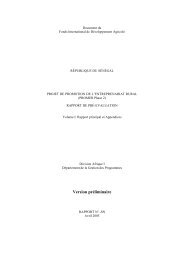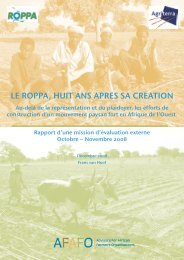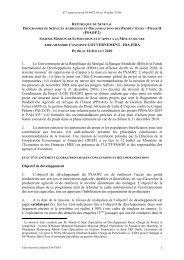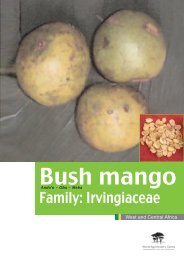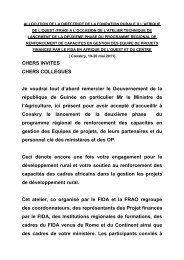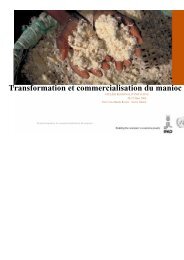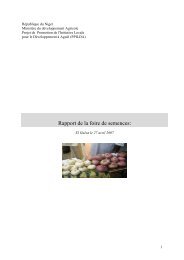Scaling Up the Fight Against Rural Poverty - FIDAfrique
Scaling Up the Fight Against Rural Poverty - FIDAfrique
Scaling Up the Fight Against Rural Poverty - FIDAfrique
You also want an ePaper? Increase the reach of your titles
YUMPU automatically turns print PDFs into web optimized ePapers that Google loves.
first laid out in 1978 and as subsequently amended (IFAD 1998). If successful, IFAD’s projects were<br />
to be handed off to o<strong>the</strong>r, better resourced institutions for <strong>the</strong> scaling-up of those innovations. As<br />
envisaged by its founders, IFAD was to play a proactive role in this hand-off process.<br />
Over <strong>the</strong> decades since its creation IFAD has tended to focus more on innovation, less on <strong>the</strong> catalytic,<br />
scaling up dimension of its institutional mandate. However, even in its early years, IFAD contributed<br />
to scaling up at least in some areas. Of special note is its support for what later turned out to be a<br />
Nobel Prize-winning initiative, <strong>the</strong> Grameen Bank. IFAD’s two loans in <strong>the</strong> 1980s were a major source<br />
of funding for Grameen Bank, contributing a third each to its total sources of funds in 1984 and 1985,<br />
and two-thirds in 1986. 4 This was a significant factor allowing Grameen Bank to take off.<br />
Starting in <strong>the</strong> early 2000s IFAD recognized <strong>the</strong> opportunity which scaling up represents for <strong>the</strong><br />
institution. Statements that stressed innovation and scaling up increasingly appeared in its strategy<br />
documents. In 2004 IFAD actively participated in <strong>the</strong> Shanghai Conference on scaling up organized by<br />
<strong>the</strong> Chinese authorities and <strong>the</strong> World Bank at <strong>the</strong> behest of World Bank President James Wolfensohn.<br />
In connection with this event IFAD made a strong case for scaling up and commissioned a case study<br />
on <strong>the</strong> IFAD’s scaling up experience in Peru. 5 As we will document in this report, IFAD’s country<br />
programs show a number of successful scaling up experiences. However, a recent evaluation by<br />
IFAD’s Independent Office of Evaluation of IFAD’s record of innovation and scaling up finds that<br />
“[e]ven though <strong>the</strong> need to scale up innovations has long been recognized by IFAD, it is not<br />
adequately built into country programmes” (IFAD Independent Office of Evaluation, 2010, p. 66) and<br />
concludes that IFAD needs “to treat scaling up as mission-critical” (ibid., p. 76).<br />
Why a scaling up review for IFAD?<br />
Prior to <strong>the</strong> recently completed evaluation of innovation and scaling up carried out by IFAD’s<br />
Independent Evaluation Office and to this scaling up review, IFAD had not analyzed its record, its<br />
operational policies and processes, and its institutional capacity for scaling up. 6 In this regard IFAD is<br />
no exception among official aid agencies. While Hartmann and Linn (2008) concluded that scaling up<br />
has in recent years become <strong>the</strong> focus of analysis for selected sectors and <strong>the</strong>matic areas, <strong>the</strong>y did not<br />
find any assessment or evaluation of <strong>the</strong> institutional scaling up capacity and practices of individual<br />
aid agencies. Therefore, one of <strong>the</strong>ir recommendations for improved aid delivery was that aid agencies<br />
should carry out institutional scaling up “audits” or reviews. IFAD is <strong>the</strong> first development assistance<br />
agency to sponsor such a review. This can serve as an input for IFAD’s management to decide whe<strong>the</strong>r<br />
and how to enhance IFAD’s orientation and capacity for scaling up. It can also serve as a pilot<br />
assessment, which o<strong>the</strong>r aid agencies may wish to emulate.<br />
This is an especially important and opportune time for IFAD to focus on <strong>the</strong> scaling up agenda for a<br />
number of reasons:<br />
• In <strong>the</strong> wake of <strong>the</strong> global food crisis of 2007/8 <strong>the</strong> international community has renewed its<br />
attention to food security, agriculture and rural development.<br />
• The G8 summit at L’Aquila in 2009 committed to raise $20 billion for food security.<br />
4 1983 was <strong>the</strong> year of Grameen Bank’s formal establishment. For background on <strong>the</strong> early years of Grameen<br />
Bank and documentation of IFAD’s engagement see Hossain (1988). The numbers cited in <strong>the</strong> text at taken from<br />
Table 42 on p. 71.<br />
5 See Elhaut (2004), Massler (2004).<br />
6 The innovation and scaling up evaluation overlapped substantially in time with <strong>the</strong> institutional scaling up<br />
review. While <strong>the</strong> former focused principally on innovation, <strong>the</strong> latter focused principally on scaling up.<br />
However, <strong>the</strong> scaling up review benefitted significantly from <strong>the</strong> assessment of <strong>the</strong> evaluation results and <strong>the</strong><br />
staff survey carried out by <strong>the</strong> Office of Evaluation; and Johannes Linn served as Senior Adviser to <strong>the</strong><br />
evaluation. The exercises were <strong>the</strong>refore highly complementary and to mutual benefit.<br />
6



